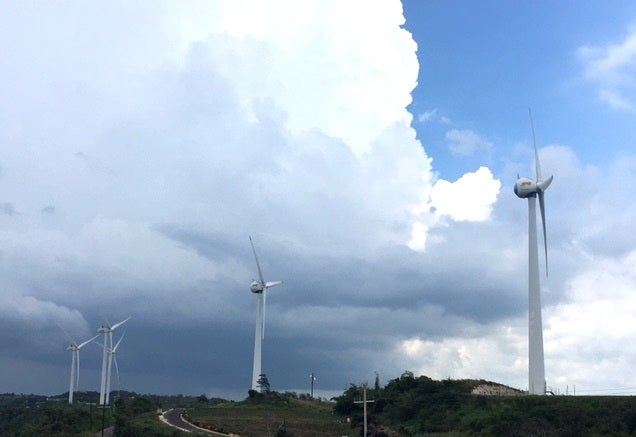
Last month, a new wind farm began spinning its blades in Jamaica. At 36 megawatts (MW) it became Jamaica’s largest private-sector renewable energy project, set to diversify the country’s energy matrix, reducing its high electricity prices and generating significant environmental and social benefits.
The island nation has, for the longest time, relied heavily on imported fossil fuels which have accounted for more than 90 percent of Jamaica’s energy demands. This dependence has led to high electricity prices creating a burden on the country’s economy. The high cost of importing energy, compounded by significant transmission and distribution losses from an antiquated grid, have resulted in high electricity prices for Jamaican consumers. This has been an impediment to the country’s economic development, undermining its growth and living standards. Apart from economic and social impacts, the heavy reliance on fossil fuels has certainly had its effects on the environment in Jamaica as in many of its Caribbean neighbors.
The national government has set an ambitious target to lower energy costs and generate 30 percent of its energy from renewables by 2030. To meet this target, diversify the energy mix and address mounting environmental issues, the Jamaican independent regulator auctioned off 78 MW for renewable energy developers in 2013. Blue Mountain Renewables Energy LLC (BMR Energy LLC) and an investor, American Capital, won the bid, ultimately investing US$26.9 million in equity to build the 36.3 megawatt Jamaica Wind Project.
The project was financed with a US$62.7 million financing package comprised of a US$42.7 million loan from the US Overseas Private Investment Corporation (OPIC), a US$10 million loan from IFC, and a US$10 million “concessional” loan - a loan priced slightly below market terms - from the IFC-Canada Climate Change Program. An important aspect of the project’s financing approach was the ‘blended finance’ that enabled investing concessional funds from Canada (through the IFC- Canada Climate Change Program) together with IFC’s own commercially-priced investment, to create a viable financing package.
Private sector financing for a first-of-a-kind project still entails significant barriers and uncertain returns, ranging from lack of market knowledge and capacity of project developers to macro-economic challenges, uncertain return levels and business environment risk, making investors hesitant to enter new and unexplored markets for low-carbon investments. In cases like this, ‘blended finance’ allows mixing public concessional funds to leverage private sector commercial funds for projects that have a high development impact and a strong potential to create a demonstration effect, but have not yet established a commercial track record.
A pioneering project in Jamaica, BMR Wind is expected to help reduce entry costs for future developers and demonstrate the bankability of private sector developed utility scale wind farms in the region. The success of this project and similar ones has encouraged the government to issue a second Request for Proposal for Renewable Energy projects, which received responses from numerous developers.
BMR Wind is set to serve an estimated 15,000 customers annually. Its 11 wind turbines are expected to generate 120,000 megawatts per year, roughly equivalent to 3 percent of Jamaica’s current energy demand. Power from the project will be sold to the Jamaica Public Service (JPS) Company, under a 20-year power purchase agreement. This electricity is expected to be among the lowest cost sources of power available on the JPS system.
In addition to helping to modernize and diversify Jamaica’s power sector, the BMR Jamaica Wind project is expected to produce significant environmental and social benefits. The wind farm is expected to reduce greenhouse gases by about 66,000 tons CO2 equivalent per year, roughly equivalent to taking 13,000 cars off the road.
Reducing dependence on fossil fuels not only diversifies the country’s energy mix but also contributes to climate change solutions. The project has also become an important contributor to the Government of Jamaica’s ambitious renewable energy program, itself a leader in the Caribbean.
More information on IFC’s blended climate finance program here.


Join the Conversation